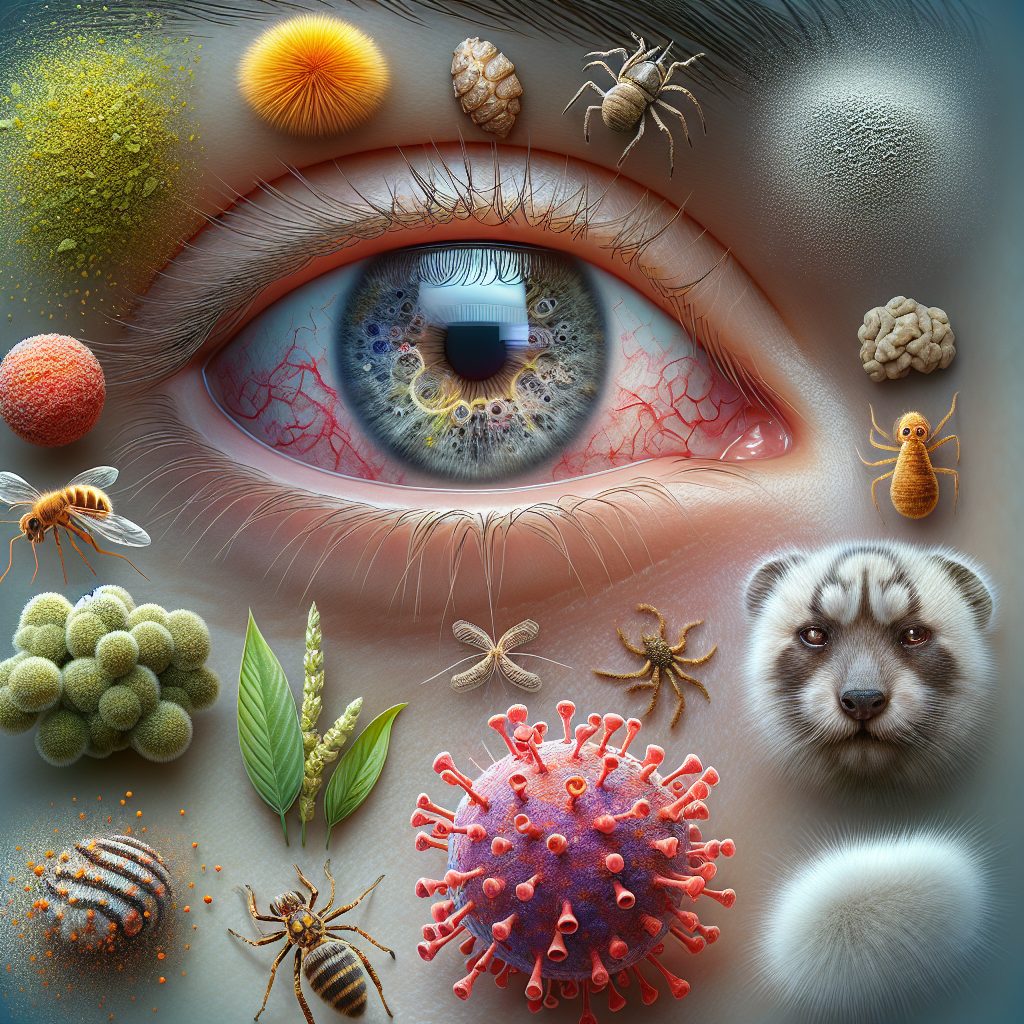
Allergens are substances that when introduced to the body, provoke an immune response causing an allergic reaction. This is an adverse reaction whereby the body releases chemicals in response to the allergen and inflammation results. Allergic conjunctivitis is inflammation of the conjunctivae caused by the presence of an allergen. Common allergens include eye drops, contact lens solution, pollen, and pet dander. These allergens can cause a wide array of symptoms, including redness, itching, pain, or watery eyes.
It is important to note that there are various types of allergic conjunctivitis. Such as; seasonal allergies, which is often caused by pollen, and perennial allergies, which is caused by dust and pet dander. Another type of allergies can be caused by irritants such as air pollution, smoke, or chemicals. Treatment for this disorder can range from medications to lifestyle and dietary changes. The key takeaways from this are to detect what type of allergic conjunctivitis is causing the symptoms, as well as to manage these symptoms with the proper measures. Next, we will delve into various treatments for allergic conjunctivitis, as well as the best practices for prevention and management.
Key Takeaways
1. Allergens, such as pollen, pet dander, and dust mites, are the most common cause of allergic conjunctivitis.
2. Symptoms of allergic conjunctivitis include watery eyes, red or swollen eyes, and itchy eyes, and can be treated with decongestants, antihistamines, and other medications.
3. Environmental control measures, such as avoiding contact with the allergen, relieving stress, and increasing humidity in the home, can be implemented to reduce exposure to allergens and mitigate symptoms of allergic conjunctivitis.
4. Allergen immunotherapy may be prescribed in severe cases of allergic conjunctivitis that cannot be treated with medication.
5. Eyedrops and other eye medications can be used to reduce inflammation and provide relief from symptoms of allergic conjunctivitis.
What Are Allergens and How Do They Impact Allergic Conjunctivitis?
Definition of Allergens
Allergens are any substances that trigger alpha-immune response in people with allergies. They can be airborne or found in foods, or even occur naturally in the environment. Some common allergens include pollen, pet dander, dust mites, and mold.
Symptoms of Allergens
When someone is exposed to an allergen, they may experience symptoms such as nasal congestion, sneezing, a runny nose, itchy eyes, wheezing, or a skin rash. All of these symptoms can be uncomfortable and cause disruption to daily life.
Allergic Conjunctivitis
Allergic conjunctivitis is an inflammation of the conjunctiva, which is the clear membrane that covers the white of the eye and the inner eyelid. It occurs due to an exposure to environmental allergens such as pollen, pet dander, dust mites, and mold. Symptoms of allergic conjunctivitis include itching, redness, tearing, and burning.
What Are the Types of Allergic Conjunctivitis?
There are two types of allergic conjunctivitis: seasonal allergic conjunctivitis and perennial allergic conjunctivitis. Seasonal allergic conjunctivitis is triggered by seasonal allergens such as pollen from trees, grass, and weeds. Perennial allergic conjunctivitis is caused by indoor allergens such as dust mites, pet dander, and mold.
Treating Allergens and Allergic Conjunctivitis
The key to treating both allergens and allergic conjunctivitis is to identify and avoid the allergens triggering the response. In some cases, antihistamines can be used to reduce itching and inflammation. For more severe cases, steroidal and non-steroidal eye drops, or anti-inflammatory medications may be prescribed.
Tips for Avoiding Allergens and Allergic Conjunctivitis
1. Keep windows and doors closed, and use air conditioning whenever possible to avoid pollen.
2. Wear sunglasses or goggles outdoors to protect your eyes from pollen and dust particles.
3. Vacuum and dust regularly to reduce exposure to dust mites and pet dander.
4. Clean air vents and air filters regularly to reduce the presence of mold and other allergens in the air.
5. Consider investing in an air purifier to reduce indoor allergens in the home.
What is Allergic Conjunctivitis?
Allergic conjunctivitis is an inflammation of the conjunctiva, the thin membrane that lines the inside of the eyelids. It is an allergic reaction to inhaled or encountered allergens, such as dust mites, pollen, animal dander, and mold. Symptoms of allergic conjunctivitis may include itching, redness, swelling, burning, and watery eyes.
What are the common causes of Allergic Conjunctivitis?
The most common cause of allergic conjunctivitis is an allergic reaction to pollen from trees, grass, and weeds. Other causes may include dust mites, animal dander, and certain foods. Allergens, whether inhaled or encountered, can cause an allergic reaction, resulting in inflammation of the conjunctiva.
What are the symptoms of Allergic Conjunctivitis?
Symptoms of allergic conjunctivitis may include itching, redness, swelling, burning, and watery eyes. Other symptoms may include sneezing, itching of the nose and throat, and fever.
Is Allergic Conjunctivitis dangerous?
No, allergic conjunctivitis is usually not dangerous and does not cause any long-term harm if properly treated. If left untreated, however, it can cause serious problems, like vision loss.
How is Allergic Conjunctivitis treated?
Treatment for allergic conjunctivitis typically involves avoiding contact with allergens, taking antihistamines or decongestants, using eye washes, using lubricating eyedrops, or applying steroid drops. In severe cases, a doctor may prescribe topical eye drops to reduce inflammation and control symptoms.
Who is at risk for Allergic Conjunctivitis?
Anyone who has a sensitivity to certain allergens is at risk for allergic conjunctivitis. People who work in environments with large amounts of dust mites, pollen, animal dander, mold, or other allergens are at a higher risk.
How can I prevent Allergic Conjunctivitis?
The best way to prevent allergic conjunctivitis is to avoid contact with allergens, such as pollen, dust mites, and animal dander. If you are exposed to allergens, you should take steps to reduce your exposure, such as keeping windows closed and using an air purifier in your home.
Can Allergic Conjunctivitis lead to any other eye problems?
Yes, if left untreated, allergic conjunctivitis can lead to more serious eye problems, such as uveitis, which can cause permanent vision loss. Additionally, severe and chronic cases of allergic conjunctivitis can cause damage to the cornea, leading to permanent vision loss.
Are there any long-term effects of Allergic Conjunctivitis?
No long-term effects of allergic conjunctivitis have been reported. But, if left untreated, the condition can cause serious damage to the eye, leading to vision loss.
How can I tell if my symptoms are caused by Allergic Conjunctivitis?
If you experience redness, itching, burning, and watering of the eye, you should see an optometrist or an ophthalmologist to determine if your symptoms are caused by allergic conjunctivitis. In some cases, a physician may need to run tests to identify the allergen that is causing the reaction.
Can Allergic Conjunctivitis be cured?
No, there is no cure for allergic conjunctivitis. However, it can be managed, and in many cases, symptoms can be eliminated or minimized. The best way to manage the condition is to avoid contact with allergens and to take appropriate treatments, such as antihistamines or decongestants.
Final Thought
Allergic conjunctivitis is a common eye problem caused by an allergic reaction to inhaled or encountered allergens, such as dust mites, pollen, animal dander, and mold. It is important to identify the allergen causing the allergic reaction and to take steps to avoid contact with it. Taking preventative measures and treating the condition appropriately can help reduce the symptoms and prevent long-term damage to the eye.
Living with allergic conjunctivitis can be difficult, but the condition can be managed. With proper diagnosis and treatment, the symptoms can be minimized or eliminated. It is important to make any necessary lifestyle changes and to take preventative steps to reduce the risk of further eye damage.



